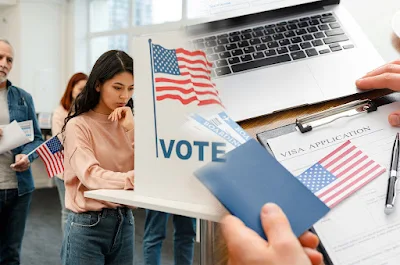The 47th US Presidential elections on November 5, 2024, are a pivotal moment not only for the American people but also for international higher education. Many political observers billed the race as the most consequential and unpredictable in decades. While candidates for both major parties, Republicans and Democrats, make their political stances, the international education sector will have to prepare for new perceptions and decisions.
Border security, pathways to citizenship, international student intake, and asylum rights have been important debate topics for each party in the US Presidential election 2024. The outcome of the US election will have far-reaching implications on immigration policies. The results will determine who can enter and remain in the country, and how they do so. Here is a look at the potential effect on immigration, covering both a Republican and Democratic victory.
Future of Temporary Work and Employment-Based Visas
The landscape for legal immigration and international students will differ significantly under the Kamala Harris administration and the Trump administration. Harris has consistently advocated more inclusive immigration policies and we will expect reforms aimed at expanding opportunities for immigrants and international students. Immigrants might encounter increased scrutiny in immigration applications if Donald Trump is re-elected as the President of the United States in 2024.
Democrats often support programmes that facilitate high-skilled immigration, as they consider it beneficial to the economy. Under the democrat administration, we may see a push for loosening caps on H-1B visas for skilled workers, particularly in research and technology sectors. Work visa processing may also see change resulting in reduced backlogs. Green card limits per country may also be adjusted to support workers from overrepresented nations such as India and China.
Employment-based immigration may not see as much expansion under Republican governance as they tend to focus on preserving opportunities for US citizens. Advocating for American workers in industries like health, tech, and engineering, the number of H-1B and other work visas may reduce under the Republican administration. Stricter requirements will ensure foreign workers are admitted only if they bring in unique skills and don’t displace American workers.
Studying in the US under the New Government
The road to studying in the US for international students may be without speedbreakers under the Harris administration. She may push for policies that simplify the visa application process and include initiatives like increased access to scholarships and financial aid for international students. Optional Practical Training (OPT) programmes that allow international students to gain work experience in the US after graduation may see enhancement and possible expansion under the Democrat government. It may become easy for students to transition from OPT to long-term work visas.
The US has supported students who pursue education in STEM fields, Democratic focus may place a particular emphasis on encouraging international students in STEM fields. Policies may be framed to give additional incentives or protections for these students to remain in the US after graduation, making it easy to switch to work visas or green cards.
Trump’s administration may restrict programmes that allow job opportunities for international students. One of Trump’s senior advisers has been a strong proponent of stricter immigration policies and had proposed eliminating OPT for STEM graduates in the past. A business-focused group opposed the proposal, but, aggressive immigration reforms might be implemented if the Republicans gain control.
An F-1 visa is the main student visa applied by a foreign student to study in the US. Applying for this visa requires admission to a US university, showing enough financial capability to support the education, and they plan to return to their home country after their studies. Obtaining a US study visa is already difficult and tricky, as one may be denied a visa just for expressing interest in staying in the US after graduation.
Stand on Legal Status and Citizenship Pathways
Democrats have been in favour of creating pathways to grant legal status to undocumented immigrants. They are particularly generous towards those brought to the US as children and long-term residents. Pathway to citizenship for Dreamers (Deferred Action for Childhood Arrivals - DACA recipients) and potentially other undocumented populations may become easier.
Republicans may typically be more restrictive in granting legal status to undocumented immigrants. Laws may be introduced that encourage undocumented immigrants to depart voluntarily. Programmes like DACA and Temporary Protection Status (TPS) may not remain effective in accomplishing the purpose they are designed for.
Family Reunification Under Different US Government
Harris administration is likely to give priority to family reunification and expand the categories of family members eligible for sponsorship. The waiting time for family-based green cards may also be reduced. Republicans are more in favour of a merit-based approach and may push to reduce family-based immigration.
Republicans may give priority to skills and economic potential over family connections when it comes to modifying family-based immigration categories. Stricter caps on family-based visas may be introduced which may limit the option for extended family reunification.
A foreign citizen needs to apply for an immigration visa (IV) to live permanently in the US. To be eligible to apply for an IV, a foreign citizen must be sponsored by an immediate family member who is at least 21 years of age. Close family members include spouses, children or parents, and there is no limit on the number of immigrants in each fiscal year.
Border Security and Immigration Enforcement
The Democratic government support robust border security but their focus is on balanced security with human rights. They usually voice to reduce family separations and prefer alternatives to detention for minors and families. Immigration courts may see increased funding during Democratic administration to reduce case backlogs, and improve efficiency and processing times for asylum seekers.
On the other hand, everyone knows about the wall construction and increased border enforcement during Trump’s previous administration. If voted to power, the Republican administration may again tighten its grip on unauthorised entries, pushing for increasing physical and technological barriers at the southern border.

Comments
Post a Comment